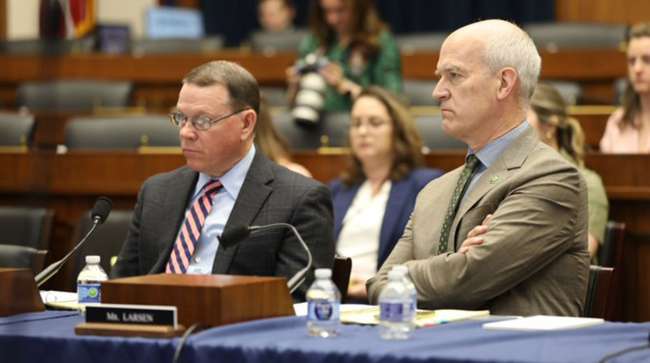Senior Reporter
House Transportation Committee Reviews AI Applications

[Stay on top of transportation news: Get TTNews in your inbox.]
WASHINGTON — The transportation panel in the U.S. House of Representatives recently received an overview from stakeholders about artificial intelligence’s role within connectivity corridors.
The Transportation and Infrastructure Committee on April 16 hosted officials from advocacy, labor and private sector groups to help inform lawmakers about AI technologies ahead of an update of highway policy legislation.
Congressional policymakers intend to draft a multiyear highway policy bill as early as next year. Tucked in the measure will be AI provisions specific to self-driving technology. The adoption of a national communication framework would impose guidelines for autonomous vehicle operations.
“Things we used to think were impossible are regularly happening before our very eyes. [Artificial intelligence] is currently being deployed across the transportation industry to help improve traffic management strategies and supply chain efficiencies, expedite infrastructure project delivery timelines, promote safer roadways and support the workforce. But this is just the beginning,” committee Chairman Sam Graves (R-Mo.) told colleagues at the April 16 roundtable.
This week, my colleagues and I participated in a @TransportGOP roundtable on the impact artificial intelligence will have in transportation, presenting opportunities for growth in safety and efficiency. pic.twitter.com/wzVheZCCUv — Rep. Mike Collins (@RepMikeCollins) April 17, 2024
“The future of AI’s capabilities is something Congress must be informed about. We don’t want to overregulate, but we also need to understand what parameters and guidelines may be helpful to this evolving part of the transportation industry,” Graves continued.
AI applications are expected to improve efficiency of key freight technologies, such as autonomous commercial vehicles. Interoperability and safety advancements also are anticipated with enhanced access to AI.
“Greater efficiency means more road, bridge, transit and rail improvements completed on time and on budget,” observed Rep. Rick Larsen (D-Wash.), the panel’s ranking member.
Artificial intelligence is evolving rapidly, affecting many aspects of transportation—from our supply chain to autonomous vehicles.
At today’s roundtable, @TransportDems and @TransportGOP discussed AI in our transportation systems and its impact on the economy and public safety. pic.twitter.com/3Sl2wqf0g6 — Committee on Transportation and Infrastructure (@TransportDems) April 16, 2024
“The safety and efficiency benefits of AI are not a given. People and goods move across this country through dynamic, interconnected networks — often at high speeds,” he continued. “AI can only generate widespread and equitable mobility improvements if the right data and assumptions underpin the system. Large, transportation-specific data sets will need to be built, and AI algorithms will need to be trained to be free from bias.”
Industry stakeholders pressed policymakers to continue examining the topic while touting AI’s potential for improving freight connectivity and commuter safety. Matthew Colvin, chief of staff with Transportation Trades Department, AFL-CIO, took part in the roundtable. “I think there is a, probably, a significant knowledge gap, that, you know, whether it’s transit agencies — that I think are already struggling with the resources they have — or local governments and certainly the federal government.”

Chace
Laura Chace, president and CEO of the Intelligent Transportation Society of America, promoted the technology’s dynamism.
“With AI, it’s a software-based product,” she said. “And so you’re talking about — you’re procuring a dynamic asset that it’s actually going to improve performance over time.”
Chace added, “It’s going to improve its capabilities. It’s going to also require more regular maintenance in terms of cybersecurity and privacy, updated data — all these characteristics that you don’t see in hard infrastructure.
Volvo's Chayene de Souza and Magnus Gustafson discuss how new, connected trucks can boost business, enhance safety practices, and reinforce preventative maintenance plans. Tune in above or by going to RoadSigns.ttnews.com.
“And so I do think we need to change our mindset a little bit of how we fund and allocate and allow for procurement of software-based solutions.”
Over the coming months, a group of House lawmakers plans to produce recommendations for legislating on AI applications. Earlier this year, House leaders established a bipartisan task force on AI. Speaker Mike Johnson (R-La.) said he anticipates the task force will produce meaningful guidelines and instructions for advancing the technology.
“Because advancements in artificial intelligence have the potential to rapidly transform our economy and our society,” Johnson said in February, “it is important for Congress to work in a bipartisan manner to understand and plan for both the promises and the complexities of this transformative technology.”
Want more news? Listen to today's daily briefing below or go here for more info:





